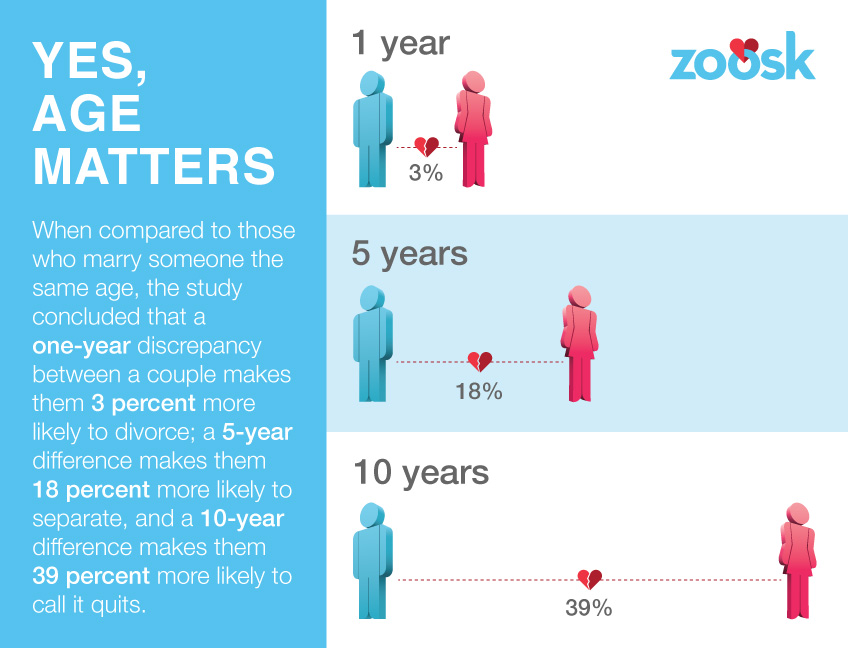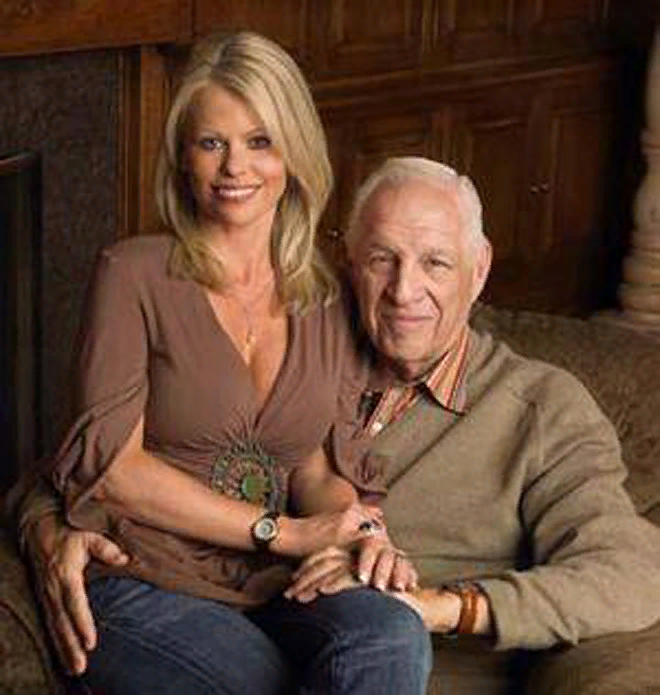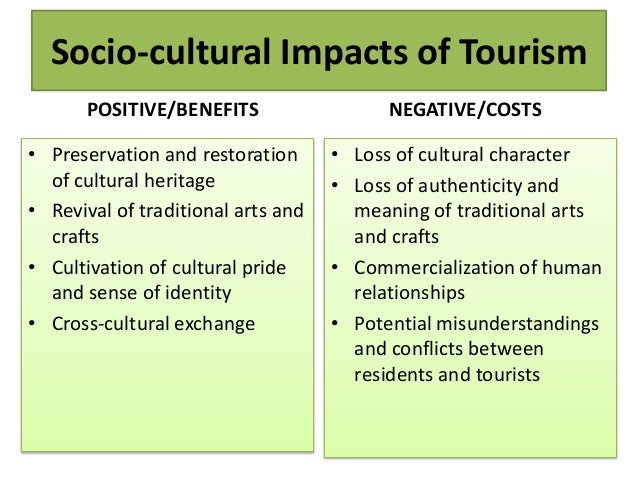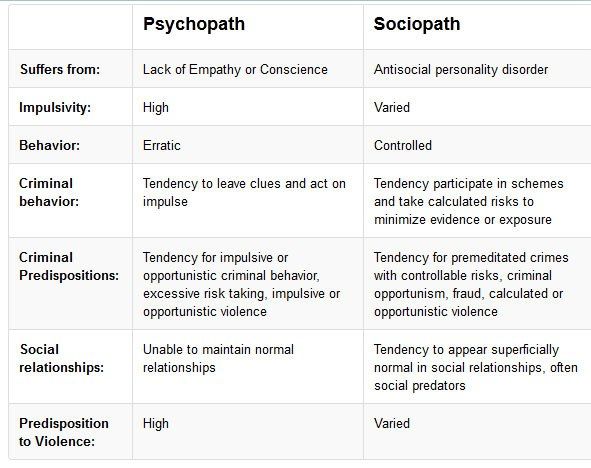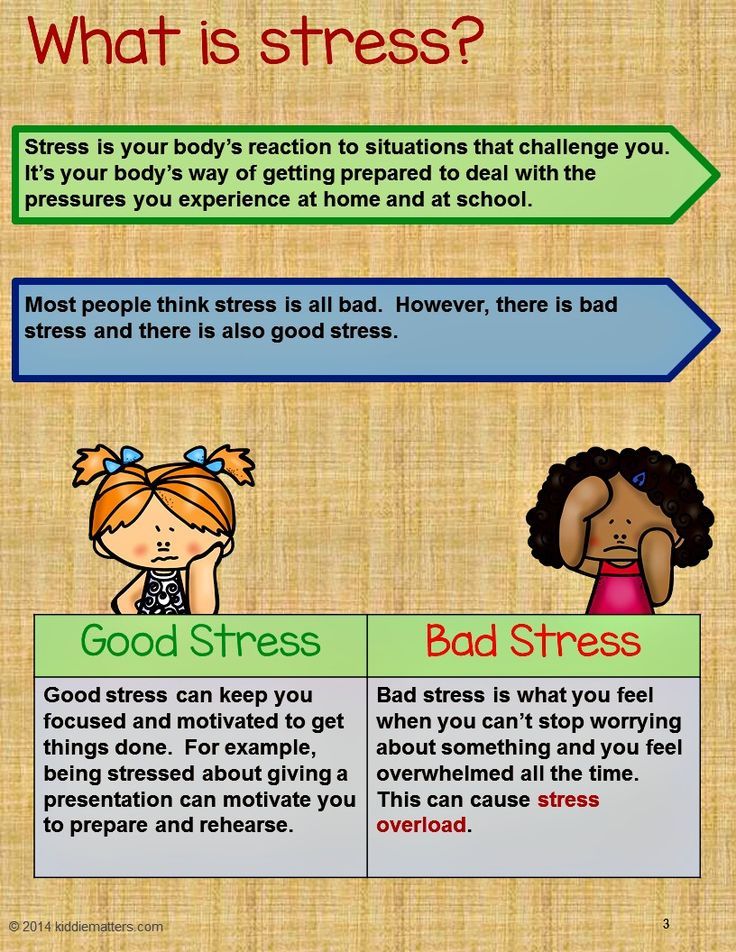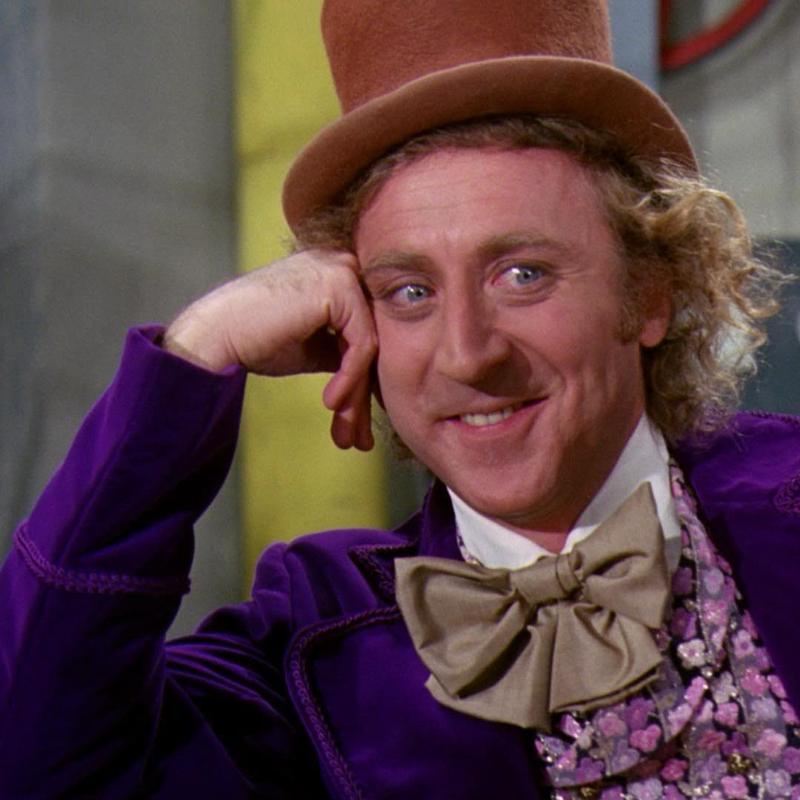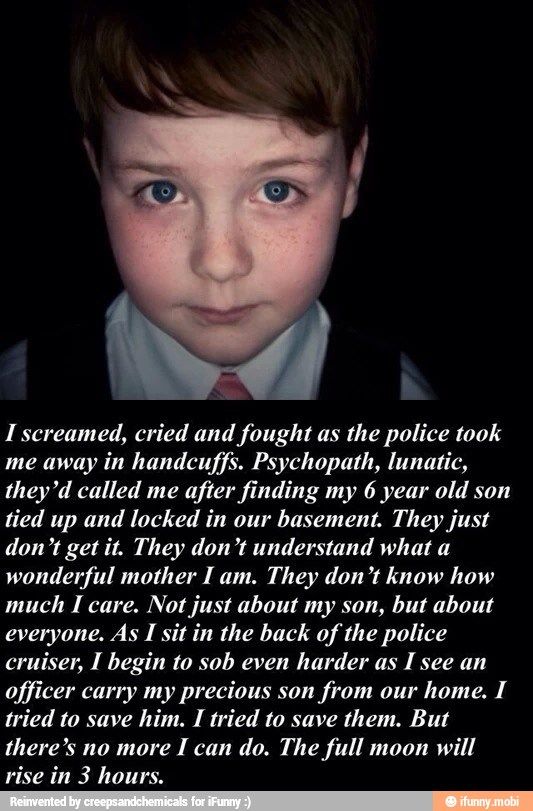Age in relationships
How Much Does Age Matter in a Relationship?
Source: Dmytro Zinkevych/Shutterstock
Age is just a number, right?
For some romantic couples, absolutely. They never think about their age as a factor in their compatibility. Of course, these couples tend to be close in age. Modest differences in age, especially when men are older, tend not to preoccupy couples as they develop their relationships.
For other couples, however, age is much more than a number. These "age-gap" relationships, sometimes called "May-December" relationships, are comprised of one person who is markedly older than the other. When a significant age gap exists between partners, age becomes a salient issue, sometimes a deal-breaker in the early stages of relationship development.
Age Isn't Like Other Characteristics
You've heard the idea that "birds of a feather flock together"? This maxim is generally true when it comes to love. People fall in love with others who are similar to them on a whole host of dimensions. Educational background, values, political orientations, race and ethnicity, leisure interests, you name it. Yet, as robust as this pattern might be, age bucks the trend. Research indicates that heterosexual couples tend to differ in age by about three years and men tend to be older (Buss, 1989; Conroy-Beam, 2019).
The standard three-year age gap has some wiggle room before age becomes salient. The larger the age gap, the more partners, and the public, might take notice.
Age Differences Can Make People Uncomfortable
Age gaps between partners can generate self-consciousness about one's relationship, concerns that the relationship won't work, and hypersensitivity towards others' ideas about the appropriateness of a relationship. In these cases, age gaps are observable; obvious. A 15-year span, a 25-year span. According to the Today Show, Katharine McPhee wasn't anticipating a positive public reaction to her relationship with David Foster, who is 35 years her senior; George Clooney has similarly confessed to Howard Stern that he didn't think his now-wife Amal would be interested in him because he's 17 years older.
The negative societal response to age gap relationships may reflect people's objections to unfair, inequitable relationships. Evidence suggests that prejudice tied to age-gap relationships is accounted for by the belief that one person (the older person) is reaping more rewards from the relationship than the other person (Collisson & De Leon, 2018). Perhaps observers respond negatively to May-December relationships because they feel as though the older person is taking advantage of the younger person.
Age Preferences Are Embedded Into Our Mating Psychology
How we think about age in romantic relationships is not arbitrary: rather, it's a crucial factor shaping how we approach relationships, according to evolutionary psychology.
Evolutionary psychology is based on the premise that the human mind has evolved adaptive strategies to support reproduction and survival (Buss, 2016). Along these lines, ancestrally, women benefited by seeking men who have the status and resources to support their child-rearing and the willingness to do so.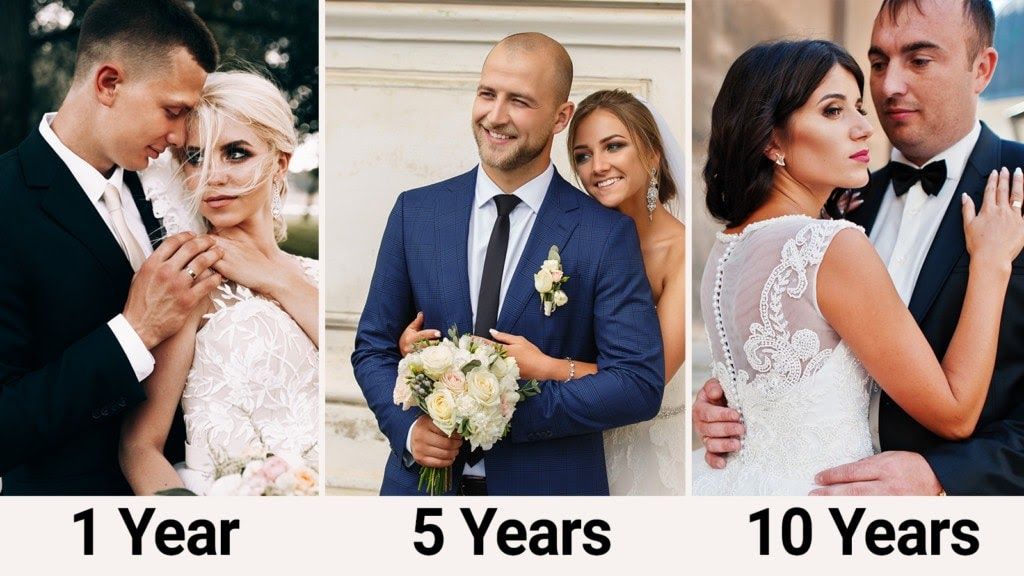 These traits are tied to older men. Men, meanwhile, have evolved a preference for younger women because their youth is a signal for fertility, and over eons and eons, men have better reproductive success when they partner with women who can bear children.
These traits are tied to older men. Men, meanwhile, have evolved a preference for younger women because their youth is a signal for fertility, and over eons and eons, men have better reproductive success when they partner with women who can bear children.
This explains why women prefer and tend to marry slightly older men, and why men tend to prefer and marry slightly younger women (with this age gap increases as men age). Large age gap relationships, therefore, often reflect men's evolved preferences for younger, fertile women and women's evolved preferences for older, high-status men.
The "Ideal" Age Gap and Direction (Men Older) May Reflect Health Outcomes
Even if men tend to be just slightly older, we all know many different-sex couples where the age difference is not only wide but also opposes that which is expected by evolutionary psychology. In other words, we know couples in which women are substantially older than their partners. Consider Nick Jonas and Priyanka Chopra, who is 10 years his senior, Hugh Jackman's wife Deborra-Lee Furness who is 13 years older than him, or Madonna's current boyfriend who is 35 years younger than her.
Oddly enough, women do tend to be older than their partners among the youngest couples, a reverse of the classic age-gap trend (Pelham, 2021). Looking at birth data in the U.S., among couples younger than 25, fathers tended to be slightly younger than mothers. This age gap quickly reverses in older age cohorts, with men in their early and mid-40s, and early and mid-50s, having children with women in their mid-30s (which is more than 20 years younger than themselves for the older age group).
Thus the general pattern, that men are older—and only somewhat older—seems to stand, making age-gap relationships unusual. The "ideal" three-ish-year age gap with men older than women, observed cross-culturally, may reflect its optimal selective fitness. Data have suggested that, regardless of maternal age, infant health is highest (e.g., survival rate) when the age gap is male-older and only slight (Pelham, 2021). In relationships where women are substantially older than their partners, infant health outcomes are not as strong, even compared to same-age women.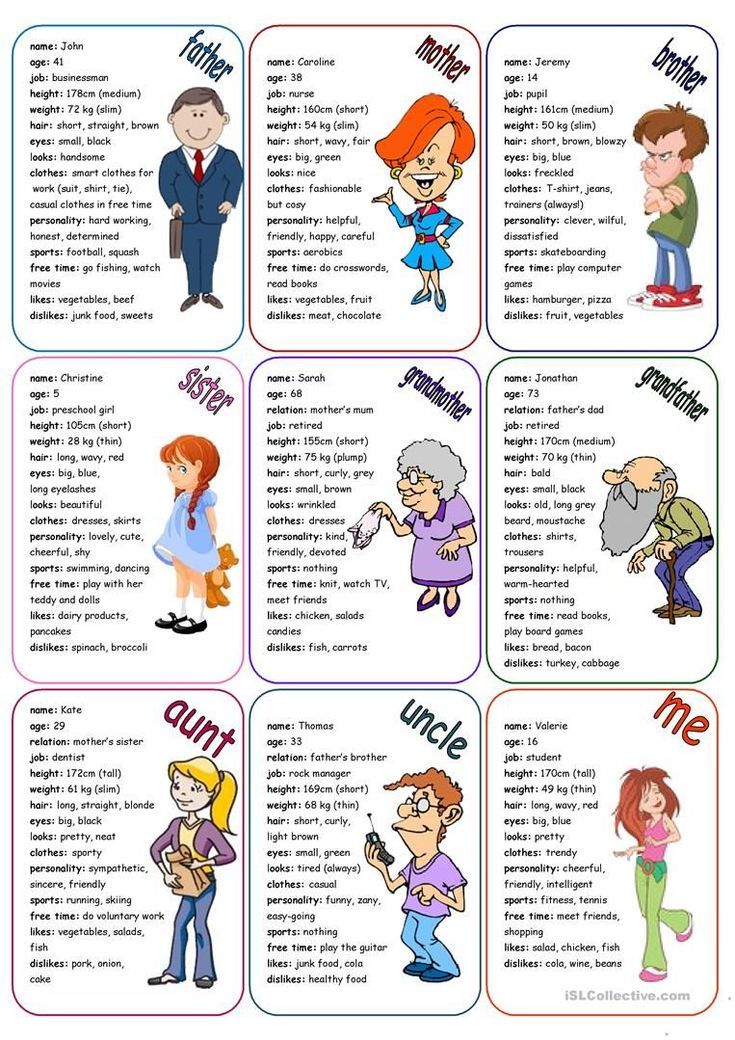 These novel data point to the origin of why the age gap is such a robust cross-cultural trend.
These novel data point to the origin of why the age gap is such a robust cross-cultural trend.
Assessing the Viability of an Age-Gap Relationship
Sure, age-gap relationships might require becoming comfortable with (or ignoring) other people's snippy comments, but many age-gap relationships can thrive. Here are four questions to ask.
- Is this a short-term or long-term relationship? The fun of a short-term fling may outweigh the challenges that might come with navigating long-term compatibility. Older partners might enjoy the vitality and physical attractiveness of a younger partner; younger partners can benefit from the status, money, and knowledge of older partners.
- Do you share the same long-term goals? Long-term relationships of any nature are more successful when couples want the same things. Because many life goals are age-linked, the question of shared goals can be more pressing for age-gap couples. Is one of your working when the other wants to retire? Do you want to spend your weekends in the same way?
- Do either of you want children? If you're in a long-term relationship and one partner is older, an open discussion about whether you want to have children (biological, adopted, fostered) can be especially important.
 Certainly, this is a discussion that partners in all long-term relationships benefit from having, but age-gap relationships may face particular challenges. Older women with younger men are less likely to be able to have a biological child and/or may be uninterested in parenting young children in their 40s or 50s; older men may likewise be wary of having a child, knowing they will be older when their children are teens. These are important conversations to broach when a relationship is expected to be long-term.
Certainly, this is a discussion that partners in all long-term relationships benefit from having, but age-gap relationships may face particular challenges. Older women with younger men are less likely to be able to have a biological child and/or may be uninterested in parenting young children in their 40s or 50s; older men may likewise be wary of having a child, knowing they will be older when their children are teens. These are important conversations to broach when a relationship is expected to be long-term. - Do you have your friends' support? Our friends and family play a role in our relationship success, whether we wish them to, or not. In general, when friends approve of relationships, they help sustain our relationship, whereas, their disapproval can be accompanied by behaviors that make it harder for us to feel invested in our relationships (Sprecher, 2011). Age-gap relationships are often stigmatized, but if friends and family approve, the relationship becomes easier to sustain.

Chronological age might tick tick tick upward, but people's perceived age and felt age might matter more for the success of a relationship. Partners with significant age gaps might be better matched in terms of their shared interests, vitality, energy, and health than many same-aged couples. Ultimately, the day-to-day emotions, thoughts, and behaviors that define a relationship are known only by those in the relationship, not by nosy outsiders. When partners are well-suited, regardless of their age gap, they can have a strong, satisfying partnership.
Facebook image: Dmytro Zinkevych/Shutterstock
All About Age Differences in Relationships
Is age “just a number?” If you’re wondering whether an age difference could impact your relationship, this is for you.
In any relationship, you’ll have some qualities in common with your partner, while others — not so much.
Some couples might find that a big age difference impacts their relationship significantly over time.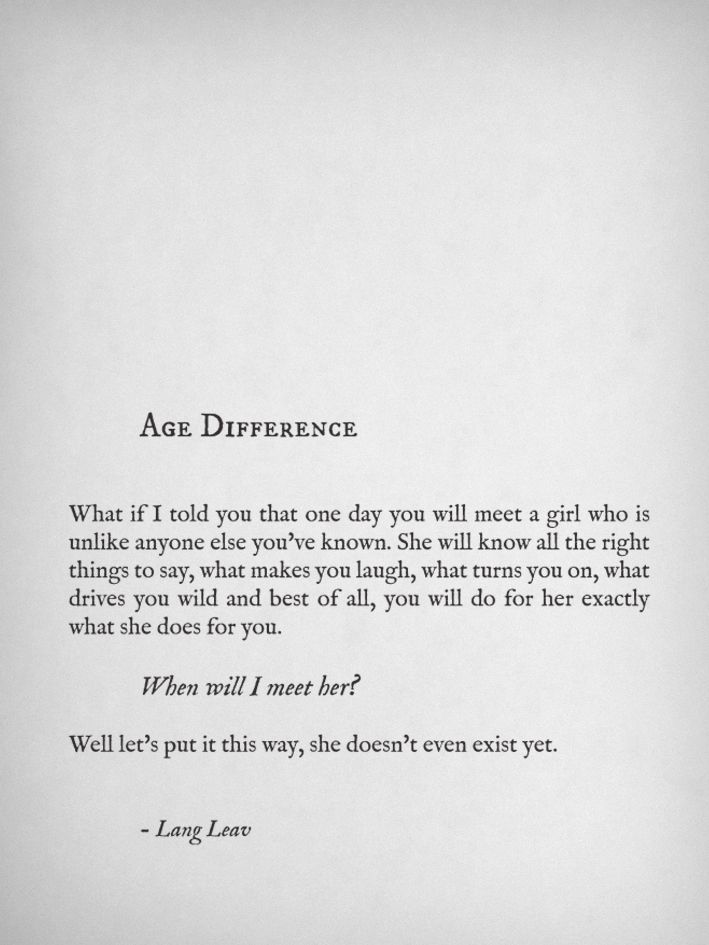 Others may feel that what makes them compatible is more important than a gap in years.
Others may feel that what makes them compatible is more important than a gap in years.
“Most of the couples I know say that they feel like they’re the same age,” says Dr. Loren Olson, a psychiatrist in Des Moines, Iowa. “We have a chronological age, a psychological age, a physical age, and a sexual age. Age gap couples frequently are compatible in the last three.”
Even if you’re satisfied with your relationship, it’s possible to encounter some challenges with a large age difference. Confronting and problem-solving these challenges — which often have to do with outside judgment — could lead to even greater happiness in your partnership.
Age and consent
This article discusses age differences in romantic relationships where both partners are above the legal age of consent in their state.
If you’re below the age of consent and an adult’s behavior is making you feel uncomfortable, help is available. You can:
- Call the National Sexual Assault Hotline at 800-656-4673 for confidential, 24/7 support.
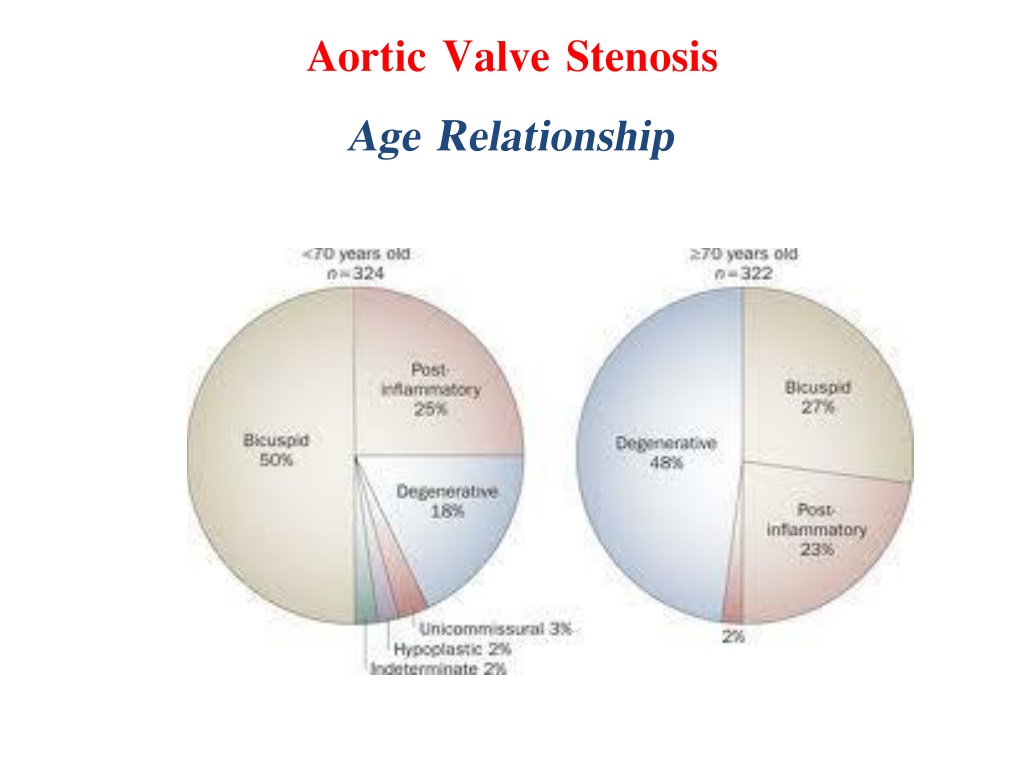
- Visit Stop It Now! for online resources or reach out to their helpline at 888-773-8368.
- Visit Childhelp for resources to handle and report abuse or to chat live with someone who can help.
P.S. If both partners are above the legal age of consent, it doesn’t mean consent goes out the window. Asking for consent and being on the same page is key in any healthy romantic relationship.
If your relationship has an above-average age difference, it might impact your connection in specific ways. Still, many of these effects aren’t unique to relationships with a large age gap, and communication is key for navigating differences in any partnership.
Emotional maturity
“Even if the age gap is small, like 4 to 5 years, different levels of maturity can be observed,” says Brandy Porche, a licensed professional counselor with MindPath. “When there is a significant difference in age, like 10 to 15 years or more, life experiences can be vastly different.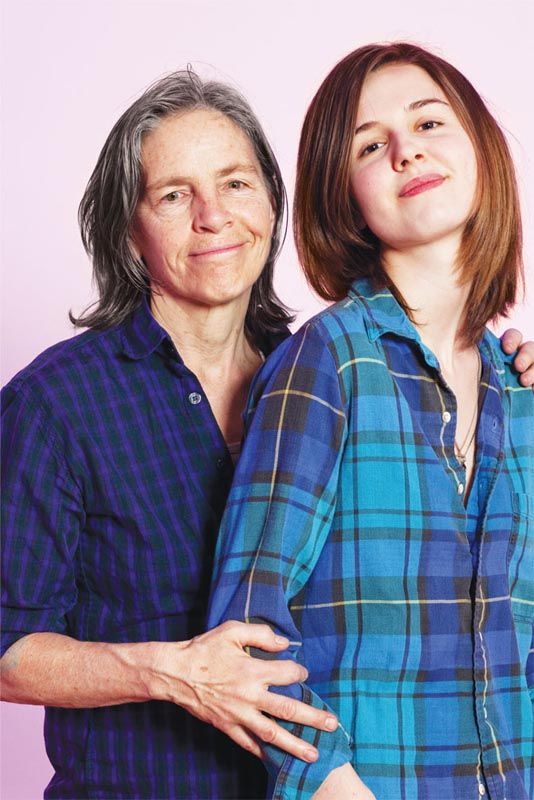 ”
”
In relationships with a large emotional maturity gap, the more mature partner could end up carrying a heavier emotional load in the relationship, leading to exhaustion and potentially a breakup.
Being the older partner doesn’t guarantee emotional maturity, just like being younger doesn’t always mean you’re less mature. People sometimes conflate age with emotional maturity because more years can mean more time to form complex perspectives through exposure to different experiences.
Priorities
“The bigger the gap between partners, the more likely the relationship will struggle with phase-of-life related challenges,” says GinaMarie Guarino, a licensed mental health counselor and founder of PsychPoint.
She explains that these challenges might include differences in:
- health
- energy levels
- life priorities
- plans to start a family
Having different priorities isn’t exclusive to relationships with large age gaps. In any relationship, it’s key to discuss each person’s priorities and hopes for the future as a part of determining your compatibility if you’re looking for a long-term relationship.
End-of-life concerns
Guarino highlights that people in relationships with big age differences may face more concerns about the longevity of the older partner. The younger partner may fear being left alone when the older partner passes.
Communicating with each other about these feelings can be an important part of processing them.
Guarino points out that making arrangements ahead of time can also provide some reassurance to the younger partner. “If one partner passes, the other partner knows they are taken care of and what their next steps are,” she explains.
In many cultures, heterosexual relationships where the man is older than the woman are still the most common. In these relationships, it’s common for an age gap of 2 to 3 years to exist.
Meanwhile, an Australian study from 2017 found:
- Heterosexual couples with large age gaps had a faster decline in relationship satisfaction in their first 6 to 10 years of marriage than similarly aged couples.

- Couples with an age gap of 1 to 3 years (with the man older than the woman) were the most common and had the greatest levels of satisfaction.
- Relationship satisfaction decreased slightly for couples with age gaps of 4 to 6 years and continued to decrease for couples with an age gap of 7 or more years.
A Korean study from 2015 found that age gaps in long-term relationships could impact each partner’s likelihood of experiencing depression. In particular, it found that same-aged couples had the lowest rates of depression, while couples with an age gap of 3 years or more had slightly higher rates.
In short, research seems to indicate that in many cultures, an age gap of 1 to 3 years is considered ideal — but some researchers suggest even a relationship with an age gap of less than 10 years will bring more satisfaction.
Still, numbers rarely tell the full story when it comes to love. It’s possible to be much older or younger than your partner and have exactly the right relationship for you.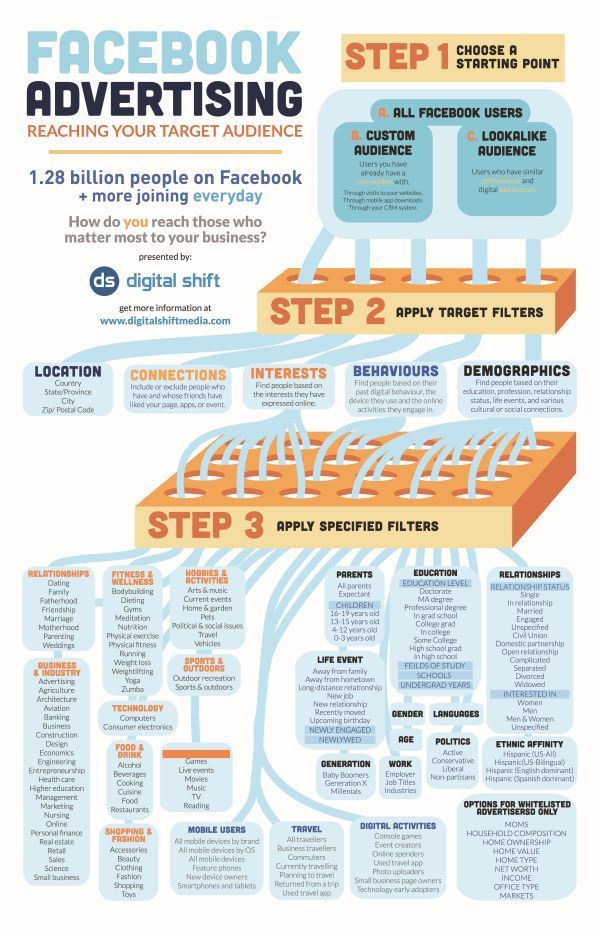
“I am 15 years older than my husband. We have been together 35 years,” says Olson. “We are very compatible in most ways. The only time age has been an issue occurs with things like at what age we should retire,” he shares.
Research from 2014 connects marriages with larger age gaps with higher rates of divorce, although further research is necessary to confirm this link. But just because this link exists, it doesn’t mean your relationship is doomed.
Regardless of age, some factors connected with relationship success include:
- higher levels of education in both partners
- financial security
- having children
- lower levels of neuroticism, or tendency to experience low moods, in both partners
- secure attachment style in both partners
- strong communication skills
- supportive relationships with other family members
- tendency to approach partner with forgiveness
- high emotional intelligence
- satisfaction with your sex life in the relationship
A relationship age gap is just one factor that can influence the success of your relationship. It won’t necessarily be the factor that makes or breaks your relationship since other factors can also play a role.
It won’t necessarily be the factor that makes or breaks your relationship since other factors can also play a role.
In relationships with large age differences, you might encounter a couple of additional roadblocks.
Social stigma
“With relationships, there will always be people on the outside looking in. Maybe even more so when outsiders visually see the age difference,” says Porche.
And in cultures where small relationship age gaps are more common, others may treat people in a relationship with a large age difference with judgment or criticism.
“The biggest challenge is facing criticism from those who feel there must be some ulterior motive for both of them,” says Olson.
For example, a younger partner might be accused of only choosing an older partner because of their wealth or status, and an older partner might be accused of choosing someone younger for the way they look.
Even if you and your partner are good at disregarding ignorant opinions of people you don’t know, it can hurt when friends or family are skeptical of a relationship you’re happy with.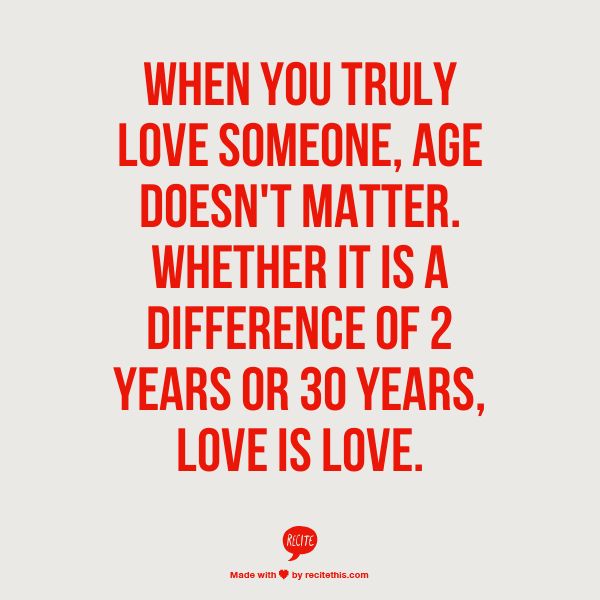
Power imbalance
Large age differences can bring up the possibility of unbalanced power dynamics. Porche explains that even in a secure relationship, an older partner might assume an authoritative role.
If this happens, it can help to openly discuss this. “Younger partners can start the conversations by saying, ‘I’m not sure if you realize it, but you just totally made that decision for me, and I would prefer to be included in the decision process next time,’” says Porche.
A power imbalance can also happen if one partner uses their partner’s financial dependence as a way to exert control over them. Whether you and your partner are separated by a few or many years, this behavior is a sign the relationship may be a source of harm.
Whether you’re dealing with less-than-understanding loved ones or concerns about the future of the relationship as you both age, these tips could help you overcome the challenge together.
Set boundaries
“When people question or judge a relationship they are not a part of, they are overstepping the couple’s boundaries,” says Guarino. She emphasizes that setting boundaries with judgmental loved ones is a good way to remind them that even if they don’t understand your relationship, they need to respect it.
She emphasizes that setting boundaries with judgmental loved ones is a good way to remind them that even if they don’t understand your relationship, they need to respect it.
Communicate
Guarino says that with any challenge a couple may face, the ability to have open and honest conversations about the challenge is key. She highlights that it’s a good idea to make time for each partner to share how they feel.
Consider your responses to others
According to Olson, it may be necessary for you and your partner to desensitize yourselves to some critical comments you might encounter. It might also be a good idea to think of a few comebacks to the most common comments you receive.
Find your support network
When it comes to dealing with outside judgment about your relationship, Olson says, “Knowing other age-discrepant couples helps.”
Finding similar couples and creating a sense of community with them could also allow you and your partner to build friendships with others who “get it.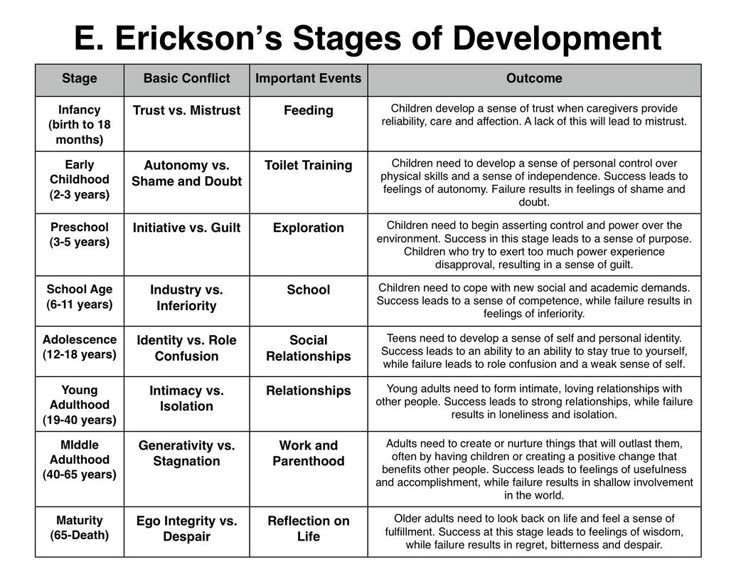 ”
”
Counseling
If you and your partner are finding it difficult to navigate these challenges alone, you can also bring in some outside support. An understanding couples counselor could help you explore different avenues for handling these challenges and expressing your thoughts about them.
In any relationship, as well as those with large age differences, feeling secure with your partner is critical, reminds Porche. “You know who you are and what your relationship means to you,” she says.
If you find outside opinions are getting to you, Porche suggests this could be an opportunity to get curious and ask yourself why. It could help to consider if there’s anything you haven’t reconciled about the relationship or if there’s anything you would like to address with your partner.
While you might encounter judgment or stigma in response to your relationship, many factors can determine your relationship’s success — and age is just a small part of that picture.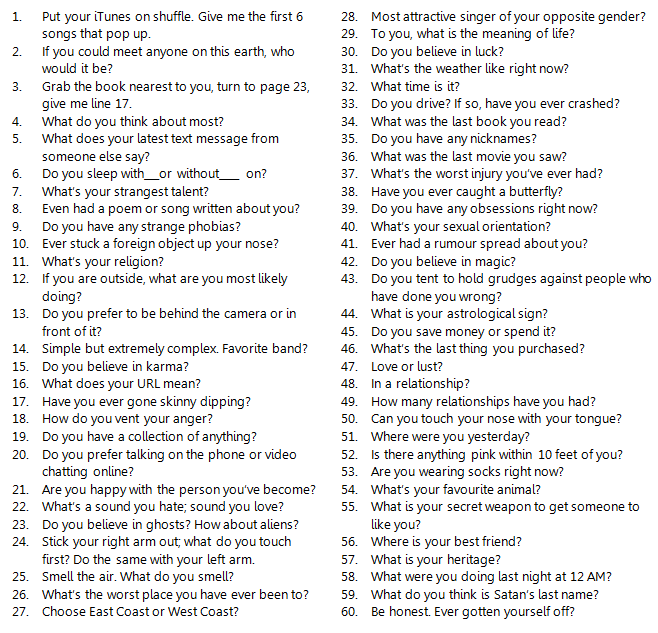
how it will affect relationships
When it comes to marriage, is age really just a number to ignore?
Website editor
Tags:
age
Marriage and relationships
Love and relationships
Age difference nine0003
So, you met him - that same prince on a white horse. You are happier than ever, and your relationship is a real standard worthy of the Chamber of Weights and Measures. You understand each other perfectly, everything is fine in bed, and it is so perfect that you didn’t even have to explain that there is no male and female homework: everything is honestly and fairly divided in half.
But friends and relatives look askance at you, because your boyfriend is quite suitable for your parents as classmates, and for you as a father. Could this be a problem? nine0003
Could this be a problem? nine0003
American psychotherapist Jenn Mann, who has been practicing for over 30 years, during this time has seen many unions where one of the partners is 10 years or more older than the other. However, we ourselves often heard about such people - there are enough celebrities who are married or married not at all to the same age. For example, Michael Douglas is now 77, and his wife Catherine Zeta-Jones is 52, and they have been together for over 20 years. And, apparently, they are quite happy, although there were some problems: in 2013, Michael said that he was going to get a divorce, but soon the movie stars announced that they were staying together. nine0003
Michael Douglas is 25 years older than his wife Catherine Zeta-Jones
Jason Momoa is 12 years younger than his wife Lisa Bonet
There are also reverse situations: say, 42-year-old Jason Momoa has been married to 54-year-old actress Lisa for four years Bonya, and before that they had been dating for 12 years.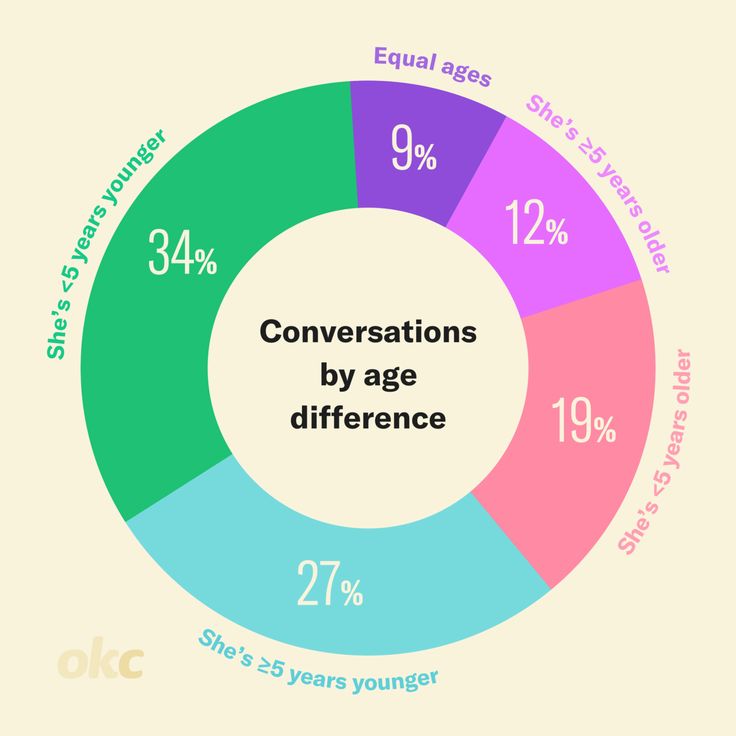 They have two children, and Jason and Lisa look very pleased with their union. But these are celebrities, but what happens in the lives of ordinary people if they choose partners much older or younger than themselves? How big is the impact of age difference on the duration and quality of relationships? nine0003
They have two children, and Jason and Lisa look very pleased with their union. But these are celebrities, but what happens in the lives of ordinary people if they choose partners much older or younger than themselves? How big is the impact of age difference on the duration and quality of relationships? nine0003
Studies show that marital satisfaction is often lower when there is a watershed of 10 years or more between husband and wife. But this, according to Dr. Mann, does not mean that you should worry about your union - you just need to be more attentive to it and understand what difficulties you have to overcome. It is also worth considering that the difference in age is also related to the number of years lived. It will be more difficult for 20- and 40-year-old partners to reach an agreement than for 50- and 70-year-old partners: the older we get, the more life experience we have that will help us cope with problems. nine0003
But why do they arise? Jenn Mann believes there are four main reasons for this.
Imbalance of power
“The main difficulty that I encounter over and over again in my practice is that with a significant difference in age, as a rule, one person has much more life experience, and often financial possibilities. This gap creates an imbalance in the pair,” says Mann.
According to her, those who are older often try to control the situation. At first, this is even pleasant for a young woman: it seems to her that a wise man takes care of her and takes full responsibility for her life together. But such impulses can easily develop into total control, and in no case should you agree to it. Just because you're younger doesn't mean you're a child! nine0003
Different frames of reference
There is a moment in When Harry Met Sally where the main character tells a friend how he asked a much younger girl where she was when Kennedy was shot. She is surprised in response: “Did Ted Kennedy get shot?” For her, Kennedy is not President John at all, but his younger brother and Senator Edward. But in Russia, for example, there will be two Chaliapins: those who grew up in the USSR will immediately remember the legendary opera singer, but those who were born later will most likely think about the Star Factory graduate. nine0003
She is surprised in response: “Did Ted Kennedy get shot?” For her, Kennedy is not President John at all, but his younger brother and Senator Edward. But in Russia, for example, there will be two Chaliapins: those who grew up in the USSR will immediately remember the legendary opera singer, but those who were born later will most likely think about the Star Factory graduate. nine0003
Small things like this point to discrepancies between people of different ages. Habitual pop culture, life experiences are significantly different. And this, of course, will make it difficult to find a common language and create a deep connection. On the other hand, why not treat it like a resource? You can learn so much from each other! The main thing is that everyone respects someone else's background.
Societal pressure
“I know a lot of people who chose a partner much older or younger than themselves and ended up breaking up with family members who judged them,” says Mann. Colleagues, friends, acquaintances, relatives - everyone will have an opinion about the fact that you are dating an “old man” or a “boy”. You have to be prepared for the fact that you will face pressure, lose support, or even find yourself in isolation. nine0003
Colleagues, friends, acquaintances, relatives - everyone will have an opinion about the fact that you are dating an “old man” or a “boy”. You have to be prepared for the fact that you will face pressure, lose support, or even find yourself in isolation. nine0003
On the other hand, why do you want those who are ready to end a relationship just because of your partner's age? Even if a boyfriend is a danger to you because he uses his advantages, really close people, on the contrary, will try to be there to insure you in case of difficulties.
Problems with parents
As Dr. Mann explains, sometimes choosing an older partner has nothing to do with his positive qualities. It is not uncommon for a person who has not worked through their problems with their mother or father to seek to recreate this dynamic in a romantic relationship without being aware of it. nine0003
"The unconscious mind doesn't know the difference between past, present and future and is always trying to heal all wounds here and now," says Mann.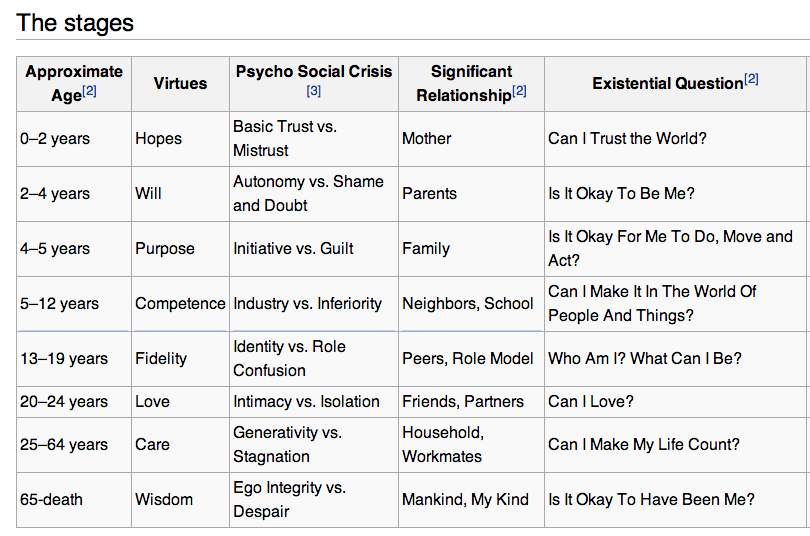 But an attempt to heal a boyfriend will not lead to anything good, and therefore you need to understand whether it’s really about feelings or you are trying to replay your relationship with your father.
But an attempt to heal a boyfriend will not lead to anything good, and therefore you need to understand whether it’s really about feelings or you are trying to replay your relationship with your father.
But if you are sure that the problems listed by Mann do not concern you, then be calm: regardless of the numbers in your passport, your relationship has the same chance of development and a happy ending "lived happily ever after" as any other. nine0003
Have you been in a relationship with a big age difference?
Photo: Getty images
Psychologist told how age difference affects relationships
Family psychologist Alena Tretyakova explained whether the numbers in the passport play an important role in relationships.
Arina Kostanyan
Tags:
Evergreen
Relationship
Psychology
Relationship psychology
ALENA TRETYAKOVA
Family psychologist
Relations between partners with age difference have always existed.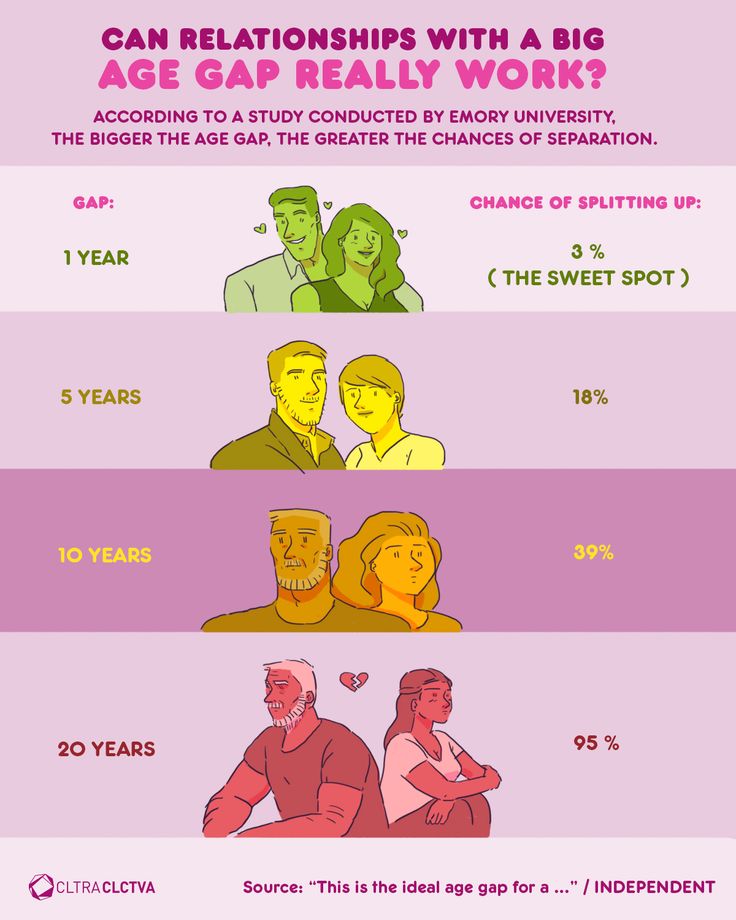 But if earlier these were, as a rule, forced marriages, when girls were forced to marry men, now such unions are concluded by mutual consent. In addition, there are more and more couples where the woman is much older than her chosen one. And although modern society is ready to accept this as the norm, partners still face certain difficulties in relationships. nine0003
But if earlier these were, as a rule, forced marriages, when girls were forced to marry men, now such unions are concluded by mutual consent. In addition, there are more and more couples where the woman is much older than her chosen one. And although modern society is ready to accept this as the norm, partners still face certain difficulties in relationships. nine0003
Speaking of age, we most often mean the biological age of a person (written in the passport - ed. note) and rarely take into account the psychological one. So, for example, until the age of 20-23, girls are ahead of boys in development, so it’s understandable that they feel more comfortable next to a boyfriend 3-5 years older than themselves. By the way, after this age, the psychological difference levels off.
There is a widespread opinion that the ideal age difference for a serious relationship is when a man is 8 years older than his chosen one. However, if we analyze the statistics of divorces, the picture is somewhat different.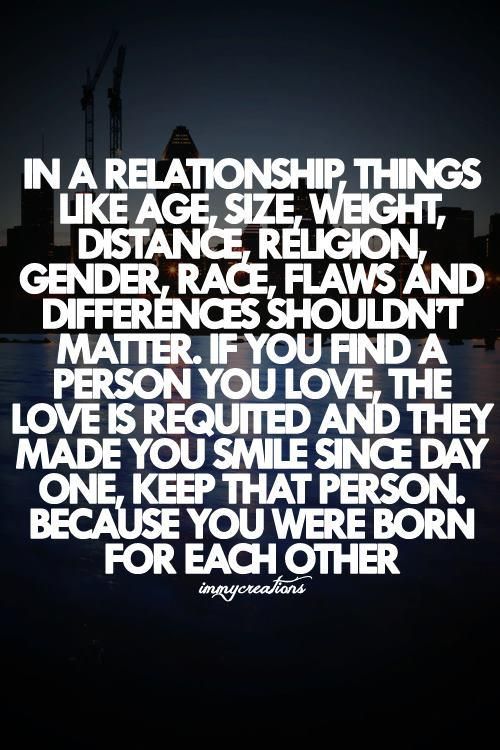 nine0003
nine0003
.
The strongest marriages are those where the difference between partners is only 1-2 years. The number of breakups begins to increase markedly from a difference of 5 years.
And this dynamics is only increasing - the older one of the partners, the higher the divorce rate. Those couples in which the man is 20 years or more older than the woman break up in more than half of the cases. To understand why marriages with a difference in age are so vulnerable, it is important to understand how relationships between partners develop in them. nine0003
At the beginning of a relationship, a mature man seems more attractive to a girl than her peers. Usually, an adult partner has already resolved the main material issues, which means that he can not only beautifully look after his beloved, but also look like a reliable support for the future family. On the one hand, this is a really serious advantage, and on the other hand, it can also become the cause of possible problems. It is here that the very 8 years emerge, within which the chosen ones still remain people of the same generation. If the difference is greater, then over time, it becomes more difficult for lovers to find common topics for conversation. After all, partners have different memories from childhood, different “generational” worldviews, different needs, so their social circles are also difficult to combine. As a result, this leads to the fact that women are forced to give up not only their own interests, but also friends. Such a marriage will be based on material goods and exactly as long as they outweigh the difficulties in the relationship. nine0003
It is here that the very 8 years emerge, within which the chosen ones still remain people of the same generation. If the difference is greater, then over time, it becomes more difficult for lovers to find common topics for conversation. After all, partners have different memories from childhood, different “generational” worldviews, different needs, so their social circles are also difficult to combine. As a result, this leads to the fact that women are forced to give up not only their own interests, but also friends. Such a marriage will be based on material goods and exactly as long as they outweigh the difficulties in the relationship. nine0003
The second reason why women want to connect their lives with a man older than themselves is that they are looking for a substitute for the role of father. And this does not always happen because the girl's parent was bad, and she did not receive something in her childhood. The reason may also be too strong attachment to the father, the absence of which is very felt.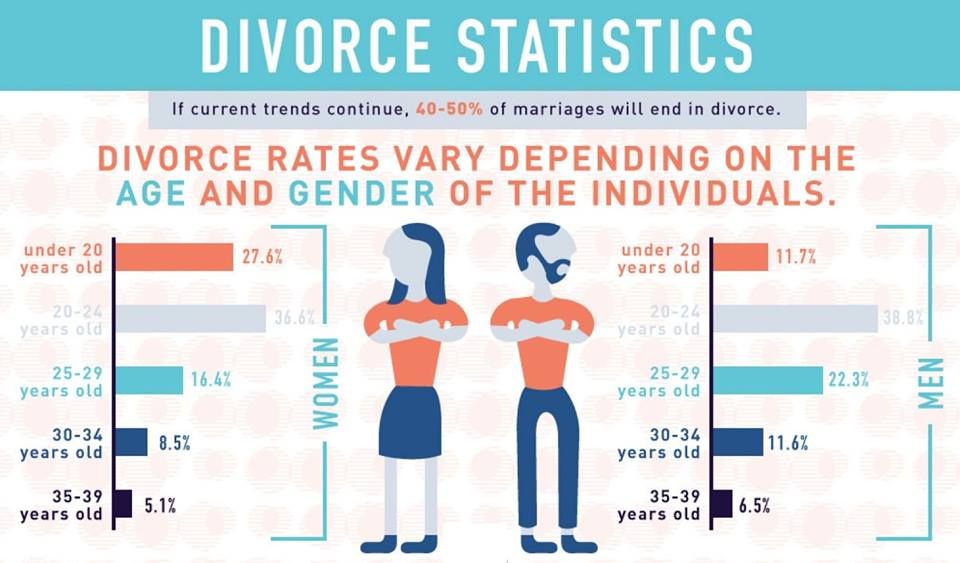 The main difficulty in such a relationship is the constant dissatisfaction of a man, his groundless jealousy and criticism. This is because the partner subconsciously feels that he is in a strange place, so he is not perceived as a man. Such marriages can last quite a long time, but there will always be tension in them. nine0003
The main difficulty in such a relationship is the constant dissatisfaction of a man, his groundless jealousy and criticism. This is because the partner subconsciously feels that he is in a strange place, so he is not perceived as a man. Such marriages can last quite a long time, but there will always be tension in them. nine0003
The reasons why women choose younger partners can be different: from unrealized maternal instinct to the banal “just fell in love”. However, the main problem that such couples face is a common one - this is public condemnation. Relatives ask to change their minds, girlfriends whisper behind their backs, and someone stops communicating altogether. Therefore, many do not advertise such a connection, hiding the trip to the registry office even from their closest ones. But this is not the best way out, because all the time you have to worry about whether the truth will come out. Only the readiness of partners to live through external difficulties and support each other depends on how strong such a marriage will turn out to be.